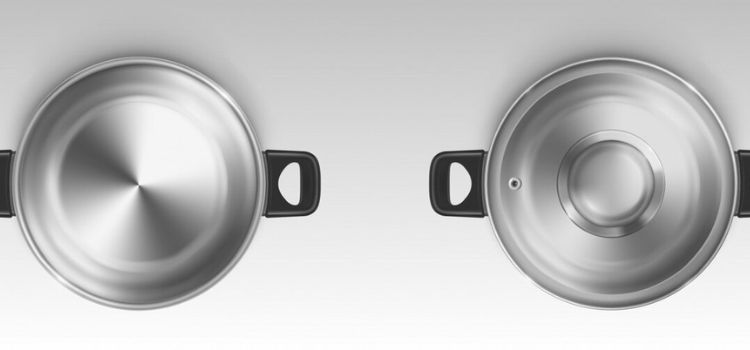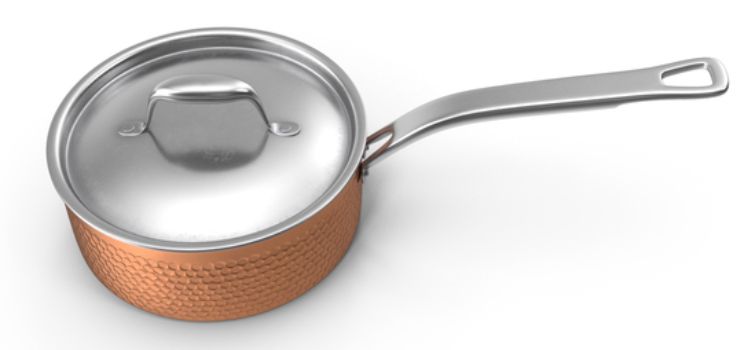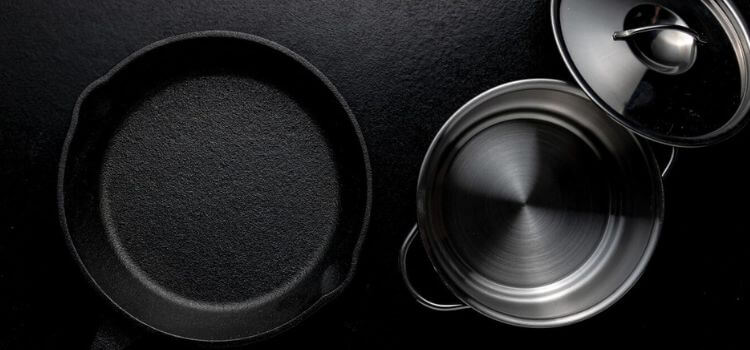Quick Answer of Titanium Vs Stainless Steel Cookware: Titanium is lighter and more durable but stainless steel will help your food cook more evenly because it heats the metal at a slower rate. Choose the one suits you better as per your cooking requirements and budget.
If you like your outdoor sports, including camping or hiking, titanium cookware is also a fantastic option as the lightweight makes it easier to carry. “Stainless steel cookware, on the other hand is widely used and very popular for residential kitchens; it lasts extremely long and does not get scratched or stained easily.”
Each material has its respective benefits, so knowing your wants and cooking tendencies can better inform what’s right for you when planning on making that addition to the kitchen. To help you get a detailed view of titanium and stainless steel cookware, let’s have a closer look at some other traits:

What Is Titanium Cookware?
I suppose you already know what titanium cookware means, but let’s clarify it…A type of cookware constructed from, yup, titanium. This metal has high strength and is lightweight, so it’s a common choice for cookware.
What Are The Benefits Of Titanium Cookware?
When it comes to the cookware, titanium has some benefits because of which, it is considered one a good choice for professional chefs as well as at home. Known for its durability, non-stick qualities, lightweight in nature and the fact that it is non-reactive makes titanium cookware what it’s known. These are but a few advantages of utilizing cookware made of titanium. Now let us examine these advantages eloquently and in depth!
Lightweight
There is perhaps no cookware as light and easy to move around as titanium which is excellent for anyone who has trouble lifting heavier pots or pans. This added feature also makes it a great option for your outdoor home cooking or taking it along with you during camping since almost all grills are portable.
Non-reactive
Coming to one of the most important ones, the non-reactive nature of your titanium cookware. This also means that it does not react with acidic or alkaline foods, so the taste and quality of your food is perfectly maintained. Furthermore, it guarantees that no tastes from the metal are transferred to the food meaning providing a pure and unaltered cooking experience.
Non-stick
While the titanium used in cookware is mostly nonstick, it’s usually coated with a different type of nonstick coating to make it as non-stick as possible! This makes cleaning and cooking very easy because the material doesn’t stick easily so you will need less oil or fats to get your food cooked. The non-stick surface also makes cooking healthier by reducing the amount of extra fats required to cook.
Durable
Another advantage of titanium cookware is its exceptional durability. Being very well resistant to scratches, dents and corrosion; so that your equipment will always keep its nice appearance as functional. As titanium is incredibly durable, it offers a lifelong value where you can use the same pots and pans throughout many years of regular cooking with an assurance they will remain in good to excellent condition.
What Are The Disadvantages Of Titanium Cookware?
Titanium cookware may not be ideal due to its high cost and potential for uneven heating compared to stainless steel. Additionally, titanium cookware may not be compatible with induction cooktops, limiting its versatility in the kitchen.
Titanium cookware has its benefits, but there are also some drawbacks to it that you should be aware of before buying.
Price
When we compare titanium to other cookware materials — particularly stainless steel, known for its similar resilience and non-reactivity — titanium is a more expensive option.
Heat Distribution
Heat distribution issues — While stainless steel distributes heat evenly, titanium doesn’t. This will result in hot spots and less thorough cooking.

What Is Stainless Steel Cookware?
Stainless: Iron, carbon and chromium-based alloy with other metals like nickel added on occasion as well Whether it is a shallow pan or a deep dish, enameled cast iron cookware is very sturdy and does not rust, stain, plus the shinny layer enveloping the rugged build of any bare metal means that it cannot react with virtually anything you could ever think of cooking on it.
Good heat distribution (better when combined with an aluminum/copper core) Cleaning of the stainless steel cookware is also pretty easy and they are simple to maintain but generally it won’t contain non-stick properties so, you may need to apply the oils or fats in order to prevent food sticking.
What Are The Advantages Of Stainless Steel Cookware?
There are multiple benefits linked with stainless steel cookery.
Durability : The countertop is highly rust, corrosion and stain-resistant which proves to be powerful last longing.
Nonreactive Surface: As long as you don’t breathe in any powder, it’s safe to cook all types of goods on with no risk of a reaction.
Heat Distribution: Often combined with a steel or copper core for uniform heat distribution
Easy maintenance: Cleaning is just as simple and usually can go in the dishwasher!
Versatile: You can use it as a frying, sautéing or boiling oil. I even use coconut oil when baking cakes instead of vegetable oils/sunflower oil etc.
Aesthetics: Still shiny, polished look that can work with any kitchen aesthetic
What Are The Disadvantages Of Stainless Steel Cookware?
Does not offer non-stick properties: Meaning that it may need more oil or fats for cooking, and that special politechnica must be used to prevent food from sticking to the surface
Heat Conductivity: Stainless steel isn’t the best heat conductor, but this is often remedied with an aluminum or copper core.
Weight: Some of these bad boys can be hefty, especially when they’re multi-layered and high-quality!
Cost: High quality stainless steel cookware is very expensive.
Requires Maintenance: It does need to be cleaned frequently, as it can stain or get water spots and isn’t naturally UV resistant like stainless steel.
Requires a little bit of skill: (Optional ) if you don’t want your food to stick on it.
Environmental Impact Comparison
You should also have a look at the environmental considerations of choosing titanium vs stainless steel cookware. Finally, titanium also boasts the added benefit of lower carbon footprint counts – stainless steel can be more environmentally deleterious in this case and is another reason to opt for it over traditional cookware. What’s more, titanium has a much longer working lifespan in comparison to other materials, which saves the overall environment as well.
In terms of the environmental aspect, it is nescesarry to take into consideration how cookware materials are produced, their utilization and effects at end-of-life. Which has the greater environmental impact, titanium cookware or stainless steel cookware? Find out what you need to know to make a well informed decision for your sustainable kitchen.
Resource Usage
- Lightweight material reduces energy consumption during transportation.
- Efficient use of raw materials due to its high strength and durability.
- Minimal water and chemical usage in the production process.
- Requires significant energy for extraction and refining of iron and other metals.
- Heavier weight increases fuel consumption during transportation.
- Considerable water usage and emissions during the manufacturing process.
Longevity And Durability
- High corrosion resistance and wear resistance can prolong its service life.
- Minimal maintenance and repairs requirements have an overall reduced environmental impact
- They are very durable—however, you might need to polish them regularly to avoid rust and scratch marks.
- This additional environmental impact can also come from the regular polishing and cleaning.
End-of-life Disposal
- Any reusable material that requires little energy flourish from present to new object.
- Overall, Land Rovers will have minimal environmental impact when crushed if they’re disposed of responsibly.
- Recyclable, although it requires a lot of energy to recycle because it is comprised of alloys.
- If it is not disposed of properly, there might be a possibility for chemical leaching.
Which One Is Better For Cooking?
For everyday home cooking, stainless steel cookware is generally better due to its durability, even heat distribution, and versatility in handling various cooking methods. However, if you need lightweight, highly durable cookware for activities like camping, titanium cookware is a better choice thanks to its light weight and excellent non-stick properties. The best option depends on your specific cooking needs and preferences.
Which One Is Better For Health?
One important point, to consider while choosing between Titanium and Stainless Steel cookware is which one is healthier.
Non-toxic Materials
- Titanium Cookware : Safe cooking done in non-toxic cookware
- Stainless Steel Cookware: Generally safe but may contain trace amounts of nickel and chromium.
Non-stick Properties
- Titanium Cookware: Naturally non-stick, without any of the harmful coatings.
- Stainless steel: Needs non-stick coating, which may have other chemicals
Which One Is Better For Your Budget?
Cost is a very important assert on Titanium and Stainless Steel cookware comparison. Here’s how Titanium and Stainless Steel compare to each other in price:
Over and over, titanium: Lightweight and strong, but generally somewhat more extravagant.
Stainless steel: most cost-effective Identical value for money, but not quite.
Conclusion
If you’re torn between titanium vs stainless steel cookware, think about where each option excels and how much it costs. Both have their own advantages & disadvantages. Choose according to your needs. So you don’t need to worry about whether or not to buy lightweight or heavy-duty cookware. Just make the decision based on what you like and can afford!
Frequently Asked Questions (FAQ) About Titanium Vs Stainless Steel Cookware
What Are the Benefits of Titanium Cookware?
Lightweight, durable and corrosion-resistant. Titanium is an excellent material for kitchenware that lasts a lifetime!
Is it safe to use a stainless steel cookware?
Yes, stainless steel is safe. The dull material guarantees that no chemicals will move once more into your food.
Which one heats more faster Titanium or Stainless steel?
Titanium cookware gets heated quickly because of its superior thermal conductivity properties which ultimately saves a lot of time in cooking.
How Can I Clean My Titanium Cookware?
To clean titanium cookware, wash it with gentle soap and warm water. Scrubby scrubby scour pads need not apply.
As an Amazon Associate, I earn from qualifying purchases

